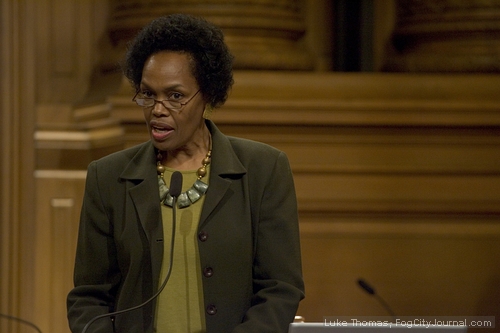
Mind the MTA budget gap: Swing vote Supervisor Sophie Maxwell took a bold step Tuesday
when she joined her Progressive colleagues and voted for a continuance of the MTA budget.
Photos by Luke Thomas
By Hope Johnson
May 22, 2009
For the sake of the greater good, I’ll admit it: I have a crush on Muni.
Well, public transit in general, but most especially our local Municipal Railway, aka Muni.
Yes, of course, I’m tempted by the glamorous Paris Metro. Indeed, I’ve lingered too long on London’s alluring Underground, swooning at each warning to “mind the gap.”
But nothing makes my heart go pitter-patter like San Francisco’s Muni. I divorced my car five years ago and haven’t looked back.
For that reason I was thrilled to find myself finally agreeing with San Francisco Municipal Transportation Agency (MTA) Executive Director Nathaniel Ford at Tuesday’s Board of Supervisors meeting as he assured District 10’s elected official, “Supervisor Maxwell, you are 100 percent right.”
Maxwell, proving her commitment to San Francisco’s transit first policy, supports the progressive majority bloc on the Board in encouraging the MTA to “mind the gap,” the $128.9 million gap, in the MTA’s budget plans by spreading responsibility for additional revenue needs equitably among car drivers and transit riders of all economic backgrounds.
Following the leadership of District 11 Supe John Avalos, the Board is considering rejecting the MTA’s proposed budget because the plan asks transit riders to suffer an economic burden four times greater than that asked of those who choose to drive cars. There’s nothing about giving a huge break to car drivers that can be seen as “transit first,” a policy favoring the smooth flow of people and goods on San Francisco streets by giving priority to public transit then balancing remaining street-use among pedestrians, bicycles, and cars.
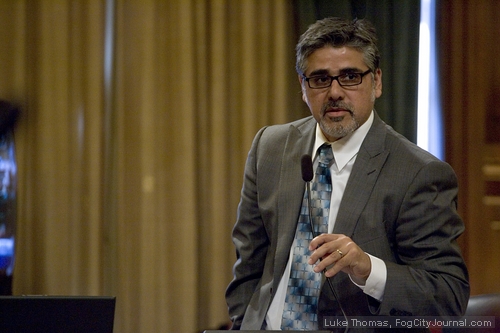
Supervisor John Avalos is leading the charge
to protect San Francisco as a transit-first city.
Maxwell has the common sense to recognize San Franciscans should expect the MTA to voluntarily investigate all possibilities for increasing revenue during a severe economic crisis, including equally increased fees on drivers when bus fares increase. She asked Ford during Tuesday’s discussion if the MTA could quickly complete a study providing accurate information on the benefits and impact of increased parking fees and meter operating hours because “that’s something when we talk about transit first that really makes sense.”
Ford’s response is more than disturbing. Despite the fact the MTA has been working on the frightening deficit since January, a parking issue study is not yet complete.
“We’ve already begun the process of the study to go out and get some more information,” Ford stated. “It’s our plan to go to the MTA board rather quickly in terms of parking and what can be done in terms of parking revenues.”
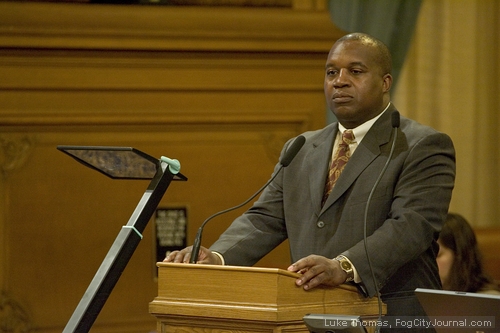
SFMTA Executive Director Nathaniel Ford
FCJ commends Maxwell for recognizing the MTA may need to feel a little extra push to get them to explore avenues that reduce the quadrupled burden on transit users. That push is provided by the pressure of a potential budget rejection.
“My concern is that without pressure, maybe the discussion won’t happen,” she explained to Ford. “And that concerns me because I think the parking issues are something we really need to look at and I want to look at it sooner rather than later, and that really concerns me.”
Ford’s spontaneous reaction that Maxwell is “100 percent right” is, also, 100 percent right, and evidence the Board’s continuation of the discussion to a special meeting next Wednesday is, also, 100 percent right.
“We are not rejecting your work, we’re saying we can do better as a transit-first city,” Supervisor Avalos encouraged Ford. “You have a few days to come back to the table about the viability of our package we have here. There’s still time actually to come up with new proposals.”
Through the Chair, an Olive Branch
FCJ loves it when the supervisors offer a cooperative solution. The Board’s continuation allows the MTA opportunity to demonstrate a good faith effort to work collaboratively with officials elected to represent the community served by the MTA.
We’ve seen this effort at peaceful collaboration before when Board members attempted to work with labor leaders to locate a qualified labor candidate for the Golden Gate Bridge District Board. Here’s to hoping the supervisors who oppose continuing efforts for a more equitable transit-first MTA budget, recognize this time the value of a collaborative olive branch offer, and choose to join in Maxwell’s cooperative spirit. Board President David Chui does.
District 7 Supe Sean Elsbernd asked Chiu directly if he intended to vote in favor of rejecting the MTA budget. Elsbernd opposed further discussion on a collaborative basis and hoped to “not have to show up for a meeting that in the end is not going to produce anything anyway.”
“I will tell you at this time I think there is still a lot of room for us to talk about where we can move things forward,” Chiu responded. “And, like Supervisor Maxwell, I do think there is additional information we could get from Mr. Ford that could illuminate this and hopefully get us to a budget we do not have to reject.”
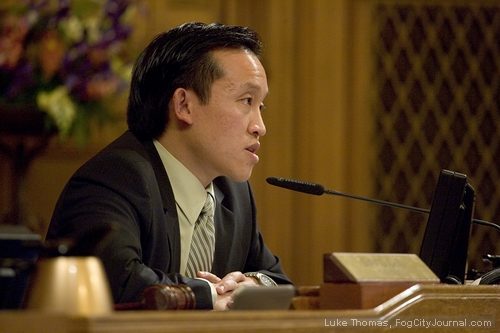
Board of Supervisors President David Chiu
By joining with the five strong votes favoring a progressive, economically equitable MTA budget, both Chiu and Maxwell have shown they are tuned in to the trend toward transit first policy becoming transit first action. For example, the day after the vote to continue, the San Francisco Transportation Authority released a draft study discouraging vehicle traffic on portions of Market Street. Also, the city is proposing new fees for developers that would partially be used to fund the new Transbay Transit Center.
Let’s hope the SFMTA and supervisors continue with an eye toward this growing trend, one that may reveal the need for changes in the way appointments are made to the seven-member MTA board. Currently, all members are appointed by the Mayor. Supe Avalos is expected to introduce a charter amendment ballot initiative providing for three appointments to be made by the Board of Supervisors, and an independent to be elected at large.
“If there’s anything we’ve learned over the past couple weeks debating the MTA budget, it’s we need to have a director of the MTA that is not ultimately responsible to one person, but to a greater part of our elected officials and the people of San Francisco,” said Avalos
Stay tuned.
Fun Fact
Congratulations to fellow online columnist Eric Smith of BeyondChron on his recent appointment to the Eastern Neighborhoods Citizens Advisory Committee. Stay “true blue” for us, Doc!
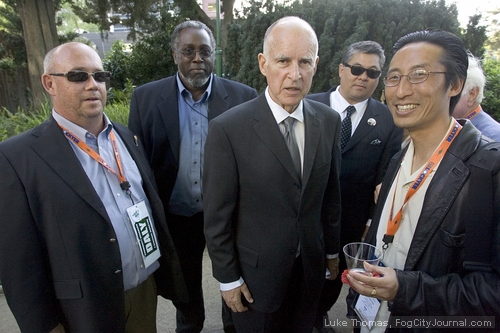
Eric “Doc” Smith (2nd from left) with open source voting systems sentinel Brent Turner,
California AG Jerry Brown and Supervisor Eric Mar.


 The Hunger Site
The Hunger Site
May 23, 2009 at 8:49 pm
The reason why this bicyclist wants Muni funded is that when we invest in Muni and make it more attractive by speeding it up and keeping fares low, we draw people out of their cars and make the streets safer for everyone involved including cyclists and pedestrians.
When we suck resources from Muni, like Gavin Newsom is doing with his accounting gimmicks, the kind of gimmicks for which voters demonstrated their distaste just this week, then we make Muni less attractive by slowing it down and reducing service and raising fares which drives people back into their cars which clogs the streets and makes Muni run slower and makes the streets more dangerous for all.
-marc
May 23, 2009 at 9:39 am
Hope,
Excellent!
Here’s another reiteration of what has gone down in the past few weeks:
The proposals to start charging for parking at metered spots from 6 to 10 pm on weekdays and on Sundays were part of the original budget that was presented to the MTA Board of Directors on April 30 — so some kind of study must have been done.
Staff were under pressure to remove those proposals (according to state law, only the supervisors — who are elected — can actually enact fee increases for parking), but they did not. Members of the MTA Board of Directors — who are appointed by the mayor but are supposed to be protected by an imaginary firewall from political pressure according to Props E and A — were then under pressure to excise the proposals. They did — and thus an inequitable budget ended up in the laps of the members of the Board of Supervisors.
The supervisors have done great work in the past few weeks trying to come up with a better budget, and people can go to Supervisor John Avalos’s website and look under “Press” to see his current “Transit Justice Proposal.”
http://www.sfgov.org/site/bdsupvrs_page.asp?id=104507
May 23, 2009 at 9:20 am
Great Hope,
So, you’re dating another subway system? Funny as hell column and dead on. A couple of comments.
First, we should recognize the historical nature of this debate and give Avalos, Chiu and Maxwell even more credit. Even the famed ‘Class of 2000’ never sent a Muni budget back and this gang of 11 has done it 2 or 3 times already and actually gotten concessions. This has really been fun to watch and read about. Congrats to FCJ for again having the earliest and best coverage of a key issue.
Second, no one has mentioned the word ‘jitney’ to Nate Ford. He would doo-doo his pants. Seriously, the jitneys were an alternative to Muni. They ranged in size from vans to small school buses and were independently owned. Drivers decorated their vehicles lavishly and played music. The fare was the same as Muni and they ran the same routes for the most part. The Board should at least broach the possibility of bringing them back.
Jitneys were destroyed by empire building Muni boosters by increasing requirements for insurance on the vehicles by something like 10,000%. We lost a viable and competitive link between taking Muni or a cab and it’s going to get worse.
That’s cause Newsom’s puppet, Ford is intent upon destroying Quentin Kopp’s best-in-the-country cab system by selling decals. In one fell swoop this will destroy the 1,500 small businesses that these medallions represent. Kudos to Daly for moving to protect the individual medallions by putting the matter before the public again. This is a battle between the greedy corporate cab companies and individual drivers and it will not end (there are a total of 6,000 drivers by the way) … the battle will not end here cause the companies have come at the voters 8 different ways over the last couple of decades to destroy the medallion system and they will not stop. Key is, neither should we.
And third, Josh Wolf is hosting a memorial for his pop (our old buddy, Len Harrison) at Dolores Park at 1pm today. Anyone had dreams of Len since his passing? I asked and have heard nothing. Huh? Oh, just hippie talk.
h.
May 23, 2009 at 8:20 am
“a policy favoring the smooth flow of people and goods on San Francisco streets by giving priority to public transit then balancing remaining street-use among pedestrians, bicycles, and cars.”
A few weeks ago in the Guardian, Leah Shahum told us what she envisioned for city streets: “Imagine streets moving so calmly and slowly that you’d let your six-year-old ride on them.” That’s a description of traffic gridlock. In the same issue, Dave Snyder, the favorite prog transportation “expert,” thought that an eight-year-old should be able to ride a bike on city streets. Progs want Muni to move “slowly,” because it’s really all about bikes, not our alleged “transit first” policy.
http://district5diary.blogspot.com/2009/05/steve-jones-anderson-is-right.html
May 22, 2009 at 7:48 pm
Pitiful